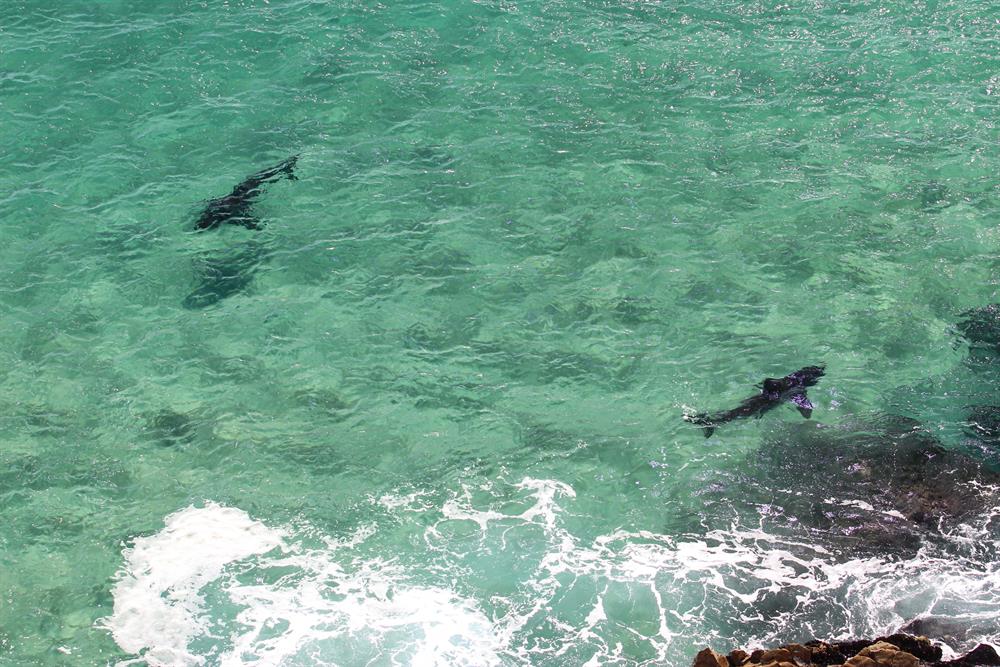GARDEN ROUTE NEWS - Tragedy struck the coastal holiday town on Tuesday 28 June when a local swimmer succumbed to injuries caused by a shark at one of the town's popular swimming beaches.
Beaches have been closed for swimming and other in-water activities since, as shark activity has increased.
On the day of the tragedy, five great white sharks were spotted along the Plett coastline - a regular occurrence in the area during the winter months.
Just after 14:00 on Tuesday 28 June, Plettenberg Bay National Sea Rescue Institute (NSRI) volunteers were alerted to the incident on Sanctuary Beach following reports by beachgoers.
NSRI rescue swimmers responded directly to the scene and two NSRI rescue craft were launched.
On arrival the body of an adult male was located and recovered from the water at the back surf line. He was loaded onto an NSRI rescue craft and brought to the rescue station.
An NSRI doctor, Western Cape Government Health EMS and the police also responded.
"Sadly, injuries sustained were fatal and the man was declared deceased by the doctor," said NSRI spokesman Craig Lambinon.
The family of the man were taken into the care of police and counsellors.
While the man's name has not been released as some family members still need to be informed, it is believed that he was a local long distance swimmer.
Caution urged
NSRI and Bitou Municipality appealed to sea users including bathers, paddlers, sailors and boaters in Plettenberg Bay and along the Southern Cape coastline to exercise caution.
"We are extremely saddened by the news of the fatal shark incident that took place in the Sanctuary Beach area. We wish to express our sincere condolences to the family and friends of the deceased," Bitou Mayor Dave Swart said in a statement.
He also thanked the NSRI crew for their speedy response and the role played by all involved in assisting the family with trauma counselling.
"The Bitou community does its utmost to ensure the safety of its residents and visitors and is extremely saddened when tragic events beyond its control happen." Swart said while Plett is renowned for its natural beauty on land and in the sea, residents and visitors needed to remind themselves "that we are visitors in nature and need to exercise caution when out in the natural environment".
He urged all participants in water activities at the sea to exercise caution, be aware of their surrounds and to heed any warnings from anyone in a position of authority. He said that the beaches in Plett will remain closed until further notice.

History of shark incidents
This is not the first shark-related incident in Plettenberg Bay. Over the years many surfers and kayakers have had run-ins. In 2015 a surfer was lucky to escape with his life after a shark bite. On 27 June that year, Dylan Reddering (19 at the time) suffered severe lacerations and muscle damage to the right side of his body - injuries that required surgery.
Experts however believe that sharks are not man-eaters as many believe. Director of research at Oceans Research in Mossel Bay, Enrico Gennari, explained that sharks investigate possible food by taking a bite.
As soon as they realise that what they had bitten into is not food, they move away. Unfortunately a bite by a shark, even if it is a case of mistaken identity, could be fatal. Shark activity on the Garden Route increases dramatically over the winter months due to many factors, including the annual sardine run and an increase in food sources.
Research manager at Shark Spotters - an organisation that conducts research focused on inshore white shark presence and behavioural ecology - Dr Alison Kock previously said it is very important to remember that sharks play a vital role in South Africa's oceans.
She explained that sharks are at the top of the food chain and they feed on a variety of prey - squid, fish, other sharks, seals and dolphins - and they even scavenge on dead whales. As a result they impact these species in two main ways: they have a direct impact on prey abundance and indirect impact on prey behaviour.
Prey will spend a lot of time trying to avoid being eaten, and the combination of these two effects means that white sharks play a regulatory role in the bay, influencing ecosystem structure and function.
She said that the presence of sharks, especially those at the top of the food chain, is a sign that there is enough food to support them, which suggests a relatively healthy ecosystem.
 A flag warning of shark activity is meant to deter people from entering the water.
A flag warning of shark activity is meant to deter people from entering the water.
'We bring you the latest Plettenberg Bay, Garden Route news'
















